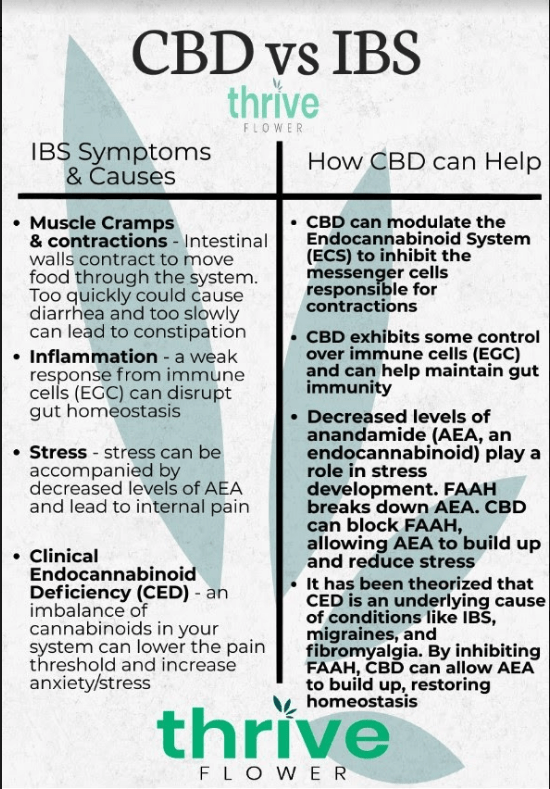CBD for IBS: How CBD can Help to Manage Symptoms of Irritable Bowel Syndrome

Irritable Bowel Syndrome (IBS)
Around 12% of us deal with the symptoms of IBS. Recurring abdominal pain, constipation or diarrhea, and bloating can have a negative effect on quality of life. The three classifications of IBS are: IBS-D (diarrhea), IBS-C (constipation), and IBS-M (mix of both). The causes of IBS are not known, but it seems that both diet and stress can trigger the symptoms of IBS. For some people, eating certain foods like citrus, dairy, or wheat can trigger IBS symptoms. Stress can also trigger symptoms, and treating an individual’s stress may help to alleviate some symptoms. Besides a change in diet and stress reduction, medication can be used to treat symptoms in severe cases of IBS (Crohn’s Foundation).
It is worth noting that irritable bowel syndrome (IBS) and irritable bowel disease (IBD) are not the same thing. Symptoms of IBD also include, anemia, bleeding, weight loss, and fever. If you are experiencing these symptoms seek immediate medical help.
So now let’s get into how CBD for IBS may help…
Cannabinoids and the Endocannabinoid System (ECS)

The medicinal properties of the cannabis plant have been used to help in the treatment of many afflictions from pain to stress to sleep and more. Cannabinoids are the molecules that make up the active part of the cannabis plant. Both hemp and mairjuana are classified as cannabis. Hemp mostly contains the cannabinoid, CBD (cannabidiol), while marijuana has high levels of THC (tetrahydrocannabinol). THC has psychoactive effects and produces the feeling of “being high”. There are over 120 different cannabinoids discovered thus far, each with its own properties.
Cannabinoids interact with the body through a system called the Endocannabinoid System (ECS). The ECS is responsible for many of the physiological functions and processes that your body performs. Its goal is to maintain a balanced, stable level of operation amongst the body’s various systems. This is called maintaining homeostasis. There are three parts of the ECS: the cannabinoids, the cannabinoid receptors, and metabolic enzymes. Aside from cannabinoids from the cannabis plant (CBD, THC, etc.) there are cannabinoids that occur naturally in your body. These are called endocannabinoids.
The prefit, ‘endo’, means from within and we know what cannabinoids are. Anandamide (AEA) and 2-AG are the most prevalent endocannabinoids. Cannabinoids activate cannabinoid receptors. The most common are CB-1 and CB-2 and they are located throughout the central and peripheral nervous systems. The third and final part of the ECS is the metabolic enzymes that break down cannabinoids and end the interaction between cannabinoid and cannabinoid receptors.
CBD For IBS

Muscle Cramps and Inflammation
The pain felt from cramps and bloating can, in part, be attributed to contractions in the intestinal walls of the digestive tract (Mayo Clinic). Strong contractions can be painful and produce gas and diarrhea. Weak contractions will not move food through the digestive system fast enough and could cause some discomfort in making a bowel movement.
The ECS has been shown to have effects on gastrointestinal processes, specifically through modulation of the CB1 receptor, by inhibiting the messenger cells that control contractions (Cannabinoids and the Gastrointestinal Tract). This can delay something called ‘gastric emptying’, which is a time measurement of how long food takes to move through your stomach to the intenstines. Too quickly can lead to diarrhea and too slowly can lead to constipation.
Discomfort may also be attributed to gut inflammation and a weak immune response from a group of cells called enteric glial cells (EGC). These cells play a vital role in “maintaining gut homeostasis” (Di, Filipps, et al). CBD for IBS was found to have some control over EGC activation, meaning that CBD may be able to help maintain a healthy gut by allowing the build up of EGCs.
Additionally, “CBD [is] a potent compound that is able to modulate . . . gut inflammation”, “thereby preventing detrimental intestinal damage” (Di Filipps, et al).
Stress

Besides the intestinal walls, IBS symptoms can arise from stress as well. One of the symptoms of IBS is something called “visceral pain” which means an uncentralized, dull pain from the internal organs. This is usually accompanied by a decrease in the endocannabinoid, anandamide (Hasenoehrl, et al). Anandamide has similar benefits to that which THC can provide, without the psychoactivity (being high) (Justinova, et al).
Remember the three parts of the ECS (cannabinoid, cannabinoid receptors, and metabolic enzymes)? Well, the metabolic enzyme, FAAH, breaks down the cannabinoid, anandamide (AEA), ending the interaction with the cannabinoid receptor, CB1. It just so happens that CBD for IBS can block the release of FAAH, allowing AEA to build up, providing you with stress relief (Bisogno, et al). Less stress can mean less discomfort from IBS.
Clinical Endocannabinoid Deficiency (CED)
It is theorized that a lack of cannabinoids or cannabinoid receptors in the body could contribute to the causes of many conditions including IBS, migraines, and fibromyalgia. Clinical Endocannabinoid Deficiency (CED), can throw off the operation of the ECS, disrupting homeostasis. This could lead to a lower pain threshold or an increase in anxiety/stress (Russo). Cannabinoids like CBD and THC can be used ro sort of ‘kick-start’ the ECS, hopefully returning to homeostasis. As mentioned above, CBD has been shown to inhibit FAAH production, allowing AEA to build up and provide you body its benefits. The use of CBD for IBS still needs studying but thus far, the results seem promising.



